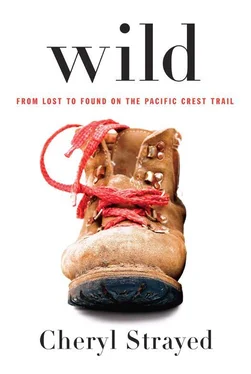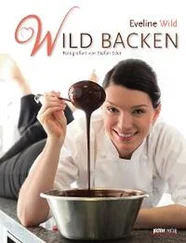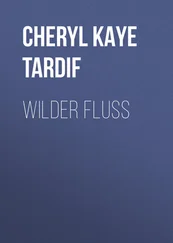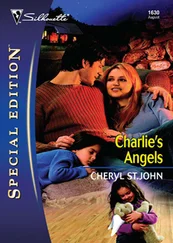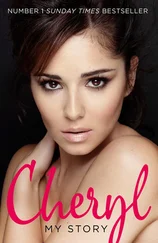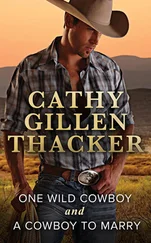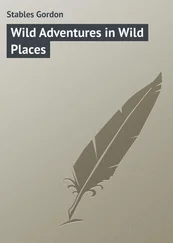Cheryl Strayed - Wild
Здесь есть возможность читать онлайн «Cheryl Strayed - Wild» весь текст электронной книги совершенно бесплатно (целиком полную версию без сокращений). В некоторых случаях можно слушать аудио, скачать через торрент в формате fb2 и присутствует краткое содержание. Год выпуска: 2012, ISBN: 2012, Жанр: Современная проза, на английском языке. Описание произведения, (предисловие) а так же отзывы посетителей доступны на портале библиотеки ЛибКат.
- Название:Wild
- Автор:
- Жанр:
- Год:2012
- ISBN:978-0-307-95765-8
- Рейтинг книги:4 / 5. Голосов: 1
-
Избранное:Добавить в избранное
- Отзывы:
-
Ваша оценка:
- 80
- 1
- 2
- 3
- 4
- 5
Wild: краткое содержание, описание и аннотация
Предлагаем к чтению аннотацию, описание, краткое содержание или предисловие (зависит от того, что написал сам автор книги «Wild»). Если вы не нашли необходимую информацию о книге — напишите в комментариях, мы постараемся отыскать её.
Wild — читать онлайн бесплатно полную книгу (весь текст) целиком
Ниже представлен текст книги, разбитый по страницам. Система сохранения места последней прочитанной страницы, позволяет с удобством читать онлайн бесплатно книгу «Wild», без необходимости каждый раз заново искать на чём Вы остановились. Поставьте закладку, и сможете в любой момент перейти на страницу, на которой закончили чтение.
Интервал:
Закладка:
Once, in the midst of one of his tirades, he threatened to throw my mother and her children naked onto the street, as if we weren’t his children too. We lived in Minnesota then. It was winter when he made the threat. I was at an age when everything was literal. It seemed precisely like a thing that he would do. I had an image of the four of us, naked and shrieking, running through the icy snow. He shut Leif, Karen, and me out of our house a couple of times when we lived in Pennsylvania, when my mother was at work and he was left to care for us and he wanted a break. He ordered us into the back yard and locked the doors, my sister and me holding our barely walking baby brother by his gummy hands. We wandered through the grass weeping and then forgot about being upset and played house and rodeo queen. Later, enraged and bored, we approached the back door and pounded and hollered. I remember the door distinctly and also the three concrete stairs that led up to it, the way I had to stand on tiptoes to see through the window in the upper half.
The good things aren’t a movie. There isn’t enough to make a reel. The good things are a poem, barely longer than a haiku. There is his love of Johnny Cash and the Everly Brothers. There are the chocolate bars he brought home from his job in a grocery store. There are all the grand things he wanted to be, a longing so naked and sorry I sensed it and grieved it even as a young child. There is him singing that Charlie Rich song that goes “Hey, did you happen to see the most beautiful girl in the world?” and saying it was about me and my sister and our mother, that we were the most beautiful girls in the world. But even that is marred. He said this only when he was trying to woo my mother back, when he was claiming that things would be different now, when he was promising her that he would never again do what he’d done before.
He always did it again. He was a liar and a charmer, a heartbreak and a brute.
My mother packed us up and left him and came back, left him and came back. We never went far. There was nowhere for us to go. We didn’t have family nearby, and my mother was too proud to involve her friends. The first battered women’s shelter in the United States didn’t open until 1974, the year my mother finally left my father for good. Instead, we would drive all night long, my sister and me in the back seat, sleeping and waking to the alien green lights of the dashboard, Leif up front with our mom.
The morning would find us home again, our father sober and scrambling eggs, singing that Charlie Rich song before long.
When my mother finally called it quits with him, when I was six, a year after we’d all moved from Pennsylvania to Minnesota, I wept and begged her not to do it. Divorce seemed to me to be the very worst thing that could happen. In spite of everything, I loved my dad and I knew if my mom divorced him I’d lose him, and I was right. After they broke up the last time, we stayed in Minnesota and he returned to Pennsylvania and only intermittently got in touch. Once or twice a year a letter would arrive, addressed to Karen, Leif, and me, and we’d rip it open, filled with glee. But inside would be a diatribe about our mother, about what a whore she was, what a stupid, mooching welfare bitch. Someday he’d get us all, he promised. Someday we’d pay.
“But we didn’t pay,” I’d said to Vince in our second and final session together. The next time I saw him, he’d explain that he was leaving his position; he’d give me the name and number of another therapist. “After my parents divorced, I realized that my father’s absence from my life was, sadly, a good thing. There weren’t any more violent scenes,” I said. “I mean, imagine my life if I’d been raised by my father.”
“Imagine your life if you’d had a father who loved you as a father should,” Vince countered.
I tried to imagine such a thing, but my mind could not be forced to do it. I couldn’t break it down into a list. I couldn’t land on love or security, confidence or a sense of belonging. A father who loved you as a father should was greater than his parts. He was like the whirl of white on the YOU ARE HERE poster behind Vince’s head. He was one giant inexplicable thing that contained a million other things, and because I’d never had one, I feared I’d never find myself inside that great white swirl.
“What about your stepfather?” Vince asked. He glanced at the notebook on his lap, reading words he’d scrawled, presumably about me.
“Eddie. He detached too,” I said lightly, as if it were nothing to me at all, as if it were almost amusing. “It’s a long story,” I said in the direction of the clock that hung near the YOU ARE THERE poster. “And time’s almost up.”
“Saved by the bell,” Vince said, and we laughed.
I could see the outline of Monster by the dim streetlights that filtered into my room in Sierra City, the feather Doug had given me sticking up from the place where I’d wedged it into my pack’s frame. I thought about corvidology. I wondered if the feather was really a symbol or if it was simply something I hauled along the way. I was a terrible believer in things, but I was also a terrible nonbeliever in things. I was as searching as I was skeptical. I didn’t know where to put my faith, or if there was such a place, or even precisely what the word faith meant, in all of its complexity. Everything seemed to be possibly potent and possibly fake. “You’re a seeker,” my mother had said to me when she was in her last week, lying in bed in the hospital, “like me.” But I didn’t know what my mother sought, exactly. Did she? It was the one question I hadn’t asked, but even if she’d told me, I’d have doubted her, pressing her to explain the spiritual realm, asking her how it could be proved. I even doubted things whose truth was verifiable. You should see a therapist , everyone had told me after my mother died, and ultimately — in the depths of my darkest moments the year before the hike — I had. But I didn’t keep the faith. I never did call the other therapist Vince had recommended. I had problems a therapist couldn’t solve; grief that no man in a room could ameliorate.
I got out of bed, wrapped a towel around my naked body, and, stepping barefoot into the hall, walked past Greg’s door. In the bathroom, I shut the door behind me, turned on the tub’s faucet, and got in. The hot water was like magic, the thunder of it filling the room until I shut it off and there was a silence that seemed more silent than it had before. I lay back against the perfectly angled porcelain and stared at the wall until I heard a knock on the door.
“Yes?” I said, but there was no reply, only the sound of footsteps retreating down the hallway. “Someone’s in here,” I called, though that was obvious. Someone was in here. It was me. I was here. I felt it in a way I hadn’t in ages: the me inside of me, occupying my spot in the fathomless Milky Way.
I reached for a washcloth on the shelf near the tub and scrubbed myself with it, though I was already clean. I scrubbed my face and my neck and my throat and my chest and my belly and my back and my rump and my arms and my legs and my feet.
“The first thing I did when each of you was born was kiss every part of you,” my mother used to say to my siblings and me. “I’d count every finger and toe and eyelash,” she’d say. “I’d trace the lines on your hands.”
I didn’t remember it, and yet I’d never forgotten it. It was as much a part of me as my father saying he’d throw me out the window. More.
I lay back and closed my eyes and let my head sink into the water until it covered my face. I got the feeling I used to get as a child when I’d done this very thing: as if the known world of the bathroom had disappeared and become, through the simple act of submersion, a foreign and mysterious place. Its ordinary sounds and sensations turned muted, distant, abstract, while other sounds and sensations not normally heard or registered emerged.
Читать дальшеИнтервал:
Закладка:
Похожие книги на «Wild»
Представляем Вашему вниманию похожие книги на «Wild» списком для выбора. Мы отобрали схожую по названию и смыслу литературу в надежде предоставить читателям больше вариантов отыскать новые, интересные, ещё непрочитанные произведения.
Обсуждение, отзывы о книге «Wild» и просто собственные мнения читателей. Оставьте ваши комментарии, напишите, что Вы думаете о произведении, его смысле или главных героях. Укажите что конкретно понравилось, а что нет, и почему Вы так считаете.
